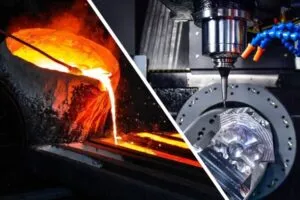In the world of CNC machining, knowing what materials can’t be machined is key. There are certain materials that are hard to work with during CNC machining. By understanding these CNC machining limitations, we can pick the right materials for our projects. This helps us avoid problems and get the best results.
Key Takeaways
- Not all materials are suitable for CNC machining.
- Understanding material properties is essential for successful machining.
- Certain soft materials and composites may fail in CNC processes.
- Brittle materials often lead to production complications.
- Choosing compatible materials minimizes tool wear and damage.
- Consulting with CNC machining services can guide material selection.
Understanding CNC Machining
CNC machining is a game-changer in manufacturing. It brings precision and efficiency to the table. Let’s explore what CNC machining is and how it works. This knowledge helps create complex parts for many industries.
What is CNC Machining?
CNC machining uses computers to control machines. This method is more accurate and consistent than manual work. It lets manufacturers make intricate designs with ease.
The CNC Machining Process
The CNC machining process has several important steps. These steps turn raw materials into finished products smoothly. The main stages are:
- Designing: Creating a detailed CAD model.
- Programming: Converting the CAD model into a CNC program using G-code.
- Machining: The CNC machine cuts, shapes, or forms the material according to the program.
- Finishing: Adding the final touches and checking quality.
Knowing these steps helps businesses use CNC technology well. This leads to high-quality products that meet customer needs.

Commonly Used Materials in CNC Machining
CNC machining uses many materials to make detailed and strong parts. Metals and plastics are key in different fields. This part talks about the most used materials, their features, and where they fit best.
Metals Frequently Machined
Metals are top choices for CNC machining because they are tough and versatile. Here are some common metals:
- Aluminum: It’s light but strong, making it great for aerospace and cars.
- Steel: Known for lasting long, steel is used a lot in building and making things.
- Titanium: It’s very strong for its weight, used in medical and space fields.
Plastics and Composites
CNC plastics and composites are also crucial. They are lighter and resist corrosion well. Here are some examples:
- Polycarbonate: It’s very resistant to impact, used in safety gear.
- Polyethylene: It’s great at handling chemicals, found in containers and car parts.
- Carbon Fiber Composites: They are strong and light, used in sports gear and cars.
What Materials Cannot Be CNC Machined?
CNC machining faces challenges with certain materials. Knowing these limits helps us pick the best materials for precise tasks. Materials that can’t be machined often lead to poor product quality. We explore two main groups: soft materials and hard, brittle ones.
Soft Materials and Their Limitations
Soft materials, like foams and some polymers, are hard to machine. They often change shape during machining, affecting the product’s accuracy and quality. The main issues are:
- They can’t keep precise sizes
- They easily tear and fray
- Getting a smooth finish is hard
Hard and Brittle Materials
Hard and brittle materials, such as ceramics and certain metals, also have machining problems. They can easily chip or break, which is risky. Their properties cause problems like:
- Tools wear out quickly
- Parts might fail
- It’s hard to make detailed designs
Knowing these CNC machining challenges helps us choose the right materials. This way, we can improve our production results.
Soft Materials: Why They Are Not Suitable
Understanding the challenges of soft materials in CNC machining is key to quality results. Foams and polymers have properties that make machining hard. Knowing these helps us choose the right materials for our projects.
Foams and Polymers
Machining foams is tricky because they compress instead of cutting cleanly. This can cause inaccuracies in the final product. Foams also tear easily under cutting forces, leading to waste and lower productivity.
Understanding Material Properties
Polymer limitations affect their CNC machining performance. Many polymers deform under stress, leading to failures. It’s important to consider material properties in CNC machining.
For example, polymers can soften at high temperatures, making machining harder. When picking materials, we must look at their mechanical properties. This helps avoid problems during machining.
| Material Type | Common Issues in CNC Machining | Recommended Uses |
|---|---|---|
| Foams | Compression, tearing, accuracy loss | Non-structural applications, packaging |
| Polymers | Deformation, softening, dimensional instability | Lightweight parts, commercial products |
Brittle Materials: The Challenges of CNC Machining
CNC machining for brittle materials like ceramics and glass is tough. These materials can break easily during the process. Knowing these challenges helps avoid problems when working with fragile materials.
Ceramics and Glass
CNC machining ceramics is tricky because they are hard but can chip. Glass is even more fragile and can break under pressure. To avoid damage, using the right tools and adjusting how fast the machine moves is key.
Brittle Metal Alloys
Brittle alloys are also hard to work with in CNC machining. They can crack or have uneven surfaces. To get it right, you need to know the alloy’s properties well. Using slower speeds and precise paths helps ensure the product is good.
Composite Materials: Machining Complications
Composite materials are known for their strength and light weight. They are used in many industries. But, they can be hard to machine. This section focuses on carbon fiber machining, which has its own set of challenges.
Carbon Fiber and Its Challenges
Carbon fiber is strong and light, perfect for aerospace and cars. But, machining it is tough. The fibers and resin mix can wear down tools and need special techniques. Here are some key challenges in carbon fiber machining:
- Tool Wear: Carbon fibers are abrasive, quickly dulling tools. Harder tools are needed.
- Surface Finish: Getting a smooth finish is hard due to fiber pull-out and delamination.
- Heat Generation: Too much heat during machining can change the material’s properties.
Other Composite Limitations
Other composite materials also have their own issues. Some of these include:
- Multi-Material Interfaces: Composites with different materials make machining harder, as each reacts differently to cutting.
- Complex Geometry: The complex shapes of composite parts can increase machining time and risk of mistakes.
- Cost of Machining: Specialized tools and techniques raise production costs, affecting budgets.
Specialty Materials That Are Hard to Machine
In CNC machining, some materials are tough to work with. They have complex structures and special properties. Knowing about these materials helps improve machining techniques and results.
Metal Matrix Composites
Metal matrix composites are made for high performance. They mix a metal base with other materials. This makes them great for aerospace and cars. But, they’re hard to machine because:
- They have a complex structure needing special tools.
- The fibers can wear down tools.
- Getting the machining right is crucial to avoid damage.
Advanced Ceramics
Advanced ceramics are also hard to machine. They’re very hard and stable at high temperatures. They’re used in tools, medicine, and electronics. But, machining them is tough because:
- They’re very brittle and can crack easily.
- Diamond tools are needed to cut them.
- Setting up the machine correctly is key to avoid damage.
Materials with High Abrasiveness
Abrasive materials pose big challenges in machining. It’s key to know their effects on CNC tools. These materials can cause a lot of tool wear, which hurts efficiency and raises costs.
Abrasive Soft Materials
Some soft materials, like plastics, seem easy to work with. But, if they’re abrasive, they change how machining goes. Here are a few examples:
- Polyurethane foam: It’s soft but can be abrasive, speeding up tool wear.
- Soft rubber compounds: They can also wear down tools because of their abrasive nature.
- Sand-filled composites: Though made for certain uses, they’re risky for CNC tool wear.
Impacts on CNC Tools
Using abrasive materials in machining has more than just tool wear. Some big effects include:
- Tools need to be replaced more often, which increases costs.
- Parts might not be as precise because tools get worn out.
- Machines use more energy to keep up speed and quality.
Knowing these points helps us choose the right tools for machining abrasive materials. This leads to better efficiency and quality in our products.
Why Certain Materials Damage Tools
Understanding how certain materials affect tool wear is key to better manufacturing. The hardness, abrasiveness, and structure of materials can cause tool damage in CNC. This leads to more downtime and wasted resources. Knowing which materials cause the most wear helps us choose better CNC tool materials.
The Cost of Tool Wear
Tool wear is common in CNC machining, but its cost can vary a lot. High wear rates mean tools need to be replaced often. This causes delays and increases costs. The main factors affecting these costs are:
- How often tools need to be changed
- Time lost for machine upkeep
- The cost of new tools
- Possible quality problems in parts
Choosing the right materials can help reduce the cost of tool wear. We should look at the hardness and abrasiveness of materials to prevent tool damage in CNC.
Tool Materials and Their Limitations
The tools we choose for CNC machining are crucial for avoiding excessive wear. Different materials have unique qualities that affect their performance. Here’s a table showing common CNC tool materials and their limitations:
| Tool Material | Hardness (HRC) | Abrasiveness Resistance | Common Applications |
|---|---|---|---|
| High-Speed Steel (HSS) | 60-67 | Moderate | General machining |
| Cemented Carbide | 85-90 | High | Heavy machining |
| Coated Carbide | 85-90 | Very High | Precision machining |
| Diamond | 80-90 | Exceptional | Abrasive materials |
Knowing the traits of these CNC tool materials helps us see their limits. Choosing the right one ensures better performance and lower costs in the long run.
Identifying Materials for CNC Machining
Choosing the right material for CNC machining is crucial for great results. Material testing is key to ensure materials meet machining needs. Knowing a material’s properties helps understand its machinability and performance.
Material Testing and Selection
Material testing checks a material’s physical and mechanical properties. It’s important to look at:
- Tensile strength
- Hardness
- Machinability ratings
- Wear resistance
This helps businesses pick materials that fit design needs and manufacturing capabilities.
Consulting with CNC Machining Services
Talking to CNC machining experts adds valuable knowledge. They share their experience and best practices for material testing and use. Key benefits include:
- Expert advice on suitable materials
- Insights into the latest machining processes
- Recommendations for optimizing production efficiency
These consultations help businesses find the right materials. This leads to better productivity and quality.
How to Choose the Right Material for CNC Machining
Choosing the right material for CNC machining is important. You need to think about several key factors. Knowing what your project needs helps you pick the best materials for better results.
Factors to Consider
When looking at materials, remember these important CNC machining factors:
- Material Strength: Make sure the material has the strength needed for your project.
- Machinability: Some materials are easier to work with than others. Think about how the material will handle machining.
- Cost: Consider your budget. Some materials might cost more but offer better performance.
- Application Requirements: Think about what your project needs, like tolerances and surface finishes.
Seeking Expert Guidance
Getting help from an expert can make choosing easier. CNC machining experts can offer advice specific to your project. They help you pick materials that meet your goals.
Conclusion
Knowing what materials can’t be CNC machined is key for those in manufacturing. This review shows why picking the right materials is important. It helps get the best results in making things.
Companies should think about material properties when using CNC machining. This helps them make smart choices for their projects. We’re dedicated to offering top-notch CNC machining services.
This lets our clients turn their ideas into real, high-quality products. Working with us means getting solutions that fit your specific needs.
We aim to make our customers confident in CNC machining. By teaching them about non-machinable materials, we help them understand better. This makes the manufacturing process easier for them.

















